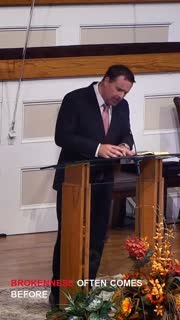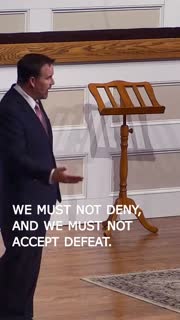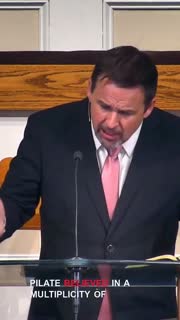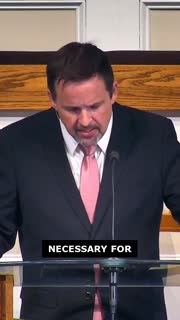From Betrayal to Triumph: Jesus' Journey to the Cross
Summary
### Summary
In John 18, we witness the events leading up to Jesus' crucifixion, focusing on three main characters: Annas and Caiaphas, Peter, and Pontius Pilate. The chapter begins with Jesus' arrest, orchestrated by Judas' betrayal. Despite being bound and taken by Jewish officers, it is clear that Jesus willingly laid down His life, demonstrating His control over the situation.
Annas and Caiaphas, the high priests, play a significant role in the deception that leads to Jesus' trial. Annas, though no longer the official high priest, is still recognized by the Jewish people. He questions Jesus, seeking a reason to present Him to the Roman authorities for execution. Despite their efforts, they find no legitimate accusation against Jesus, who had always taught openly and without fault. Their deception is evident as they manipulate the situation to bring false charges against Him.
Peter's denial of Jesus is another poignant moment. Despite his earlier boldness, Peter denies knowing Jesus three times, fulfilling Jesus' prophecy. This denial highlights Peter's human frailty and the need for brokenness before becoming useful to God. Peter's journey from denial to eventual boldness in proclaiming the Gospel serves as a powerful lesson in humility and reliance on God.
Pontius Pilate, the Roman governor, represents the act of defeat. Although he recognizes Jesus' innocence and seeks to release Him, Pilate ultimately succumbs to the pressure of the Jewish leaders and the crowd. His philosophical skepticism, encapsulated in his question, "What is truth?" reflects the moral relativism that hinders him from standing for justice.
Despite the bleakness of these events, the story does not end in defeat. Jesus' resurrection transforms the narrative, turning deception, denial, and defeat into triumph. This passage reminds us that God can overcome all obstacles, and our responsibility is to live in a way that honors Him, avoiding deception, standing boldly for Christ, and trusting in His ultimate victory.
### Key Takeaways
1. Jesus' Willing Sacrifice: Jesus' arrest was not a moment of weakness but a demonstration of His willingness to lay down His life. He controlled the situation, showing that His life was not taken from Him but given willingly. This act of love and sacrifice is central to understanding the depth of Jesus' commitment to humanity. [29:51]
2. The Deception of Annas and Caiaphas: The high priests' manipulation and false accusations against Jesus highlight the dangers of religious hypocrisy. They were more concerned with maintaining power and appearances than seeking true justice. This serves as a warning against using deception to achieve personal goals, reminding us to pursue integrity and truth. [32:52]
3. Peter's Denial and Brokenness: Peter's denial of Jesus, despite his earlier boldness, underscores the importance of humility and the necessity of brokenness before God can use us effectively. Peter's journey from denial to becoming a bold witness for Christ illustrates that God can transform our failures into powerful testimonies. [46:07]
4. Pilate's Moral Relativism: Pilate's question, "What is truth?" reflects a philosophical skepticism that prevents him from standing for justice. His inability to recognize and act on the truth leads to Jesus' crucifixion. This challenges us to hold firmly to absolute truth in a world that often embraces moral relativism. [51:44]
5. God's Ultimate Victory: Despite the deception, denial, and defeat surrounding Jesus' trial and crucifixion, God's plan prevails. Jesus' resurrection turns apparent defeat into triumph, reminding us that God can overcome all obstacles. We are called to live in this victory, trusting in God's power to transform even the bleakest situations. [56:13]
### YouTube Chapters
[0:00] - Welcome
[0:45] - Introduction to John 18
[2:10] - Jesus' Arrest and Willing Sacrifice
[5:30] - The Role of Annas and Caiaphas
[10:15] - The Deception of the High Priests
[15:00] - Peter's Denial Begins
[20:45] - The Other Disciple's Boldness
[25:30] - Peter's Second and Third Denials
[30:00] - The Impact of Peter's Denial
[35:00] - Pilate's Role and Moral Relativism
[40:00] - Pilate's Question: "What is Truth?"
[45:00] - The Hypocrisy of the Jewish Leaders
[50:00] - Pilate's Defeat and Jesus' Condemnation
[55:00] - The Triumph of Jesus' Resurrection
[59:00] - Closing Prayer and Invitation
Study Guide
### Bible Study Discussion Guide
#### Bible Reading
1. John 18:1-27
2. John 18:28-40
3. John 19:1-16
#### Observation Questions
1. What actions did Annas and Caiaphas take to manipulate the situation and bring false charges against Jesus? ([31:21])
2. How did Peter's behavior change from the time of Jesus' arrest to his denial? ([46:07])
3. What was Pilate's reaction to Jesus' claim about truth, and how did it reflect his philosophical skepticism? ([51:44])
4. How did Jesus demonstrate His control over the situation during His arrest? ([29:51])
#### Interpretation Questions
1. What does Peter's denial and subsequent brokenness teach us about the process of becoming useful to God? ([46:47])
2. How does Pilate's question, "What is truth?" reflect the moral relativism of his time, and how is this relevant to our society today? ([51:44])
3. In what ways did Annas and Caiaphas' actions exemplify religious hypocrisy, and what can we learn from their behavior? ([32:52])
4. How does Jesus' willingness to lay down His life demonstrate His love and commitment to humanity? ([29:51])
#### Application Questions
1. Reflect on a time when you felt in control of a difficult situation. How can you apply Jesus' example of willing sacrifice in your own life? ([29:51])
2. Have you ever experienced a moment of denial or failure similar to Peter's? How did you respond, and what steps can you take to rely more on God in such moments? ([46:07])
3. In what ways might you be tempted to use deception to achieve personal goals? How can you pursue integrity and truth instead? ([32:52])
4. How do you handle situations where standing for absolute truth is challenging? What can you learn from Pilate's failure to stand for justice? ([51:44])
5. Think of a recent situation where you felt defeated. How can you remind yourself of God's ultimate victory and live in a way that honors Him? ([56:13])
6. How can you cultivate humility and brokenness before God to become more effective in His service? ([46:47])
7. Identify a specific area in your life where you need to trust in God's power to transform a bleak situation. How can you take a step of faith this week? ([56:13])
Devotional
Day 1: Jesus' Willing Sacrifice
Jesus' arrest in John 18 is not a moment of weakness but a profound demonstration of His willingness to lay down His life for humanity. Despite being bound and taken by Jewish officers, Jesus shows that He is in control of the situation, willingly giving His life rather than having it taken from Him. This act of love and sacrifice is central to understanding the depth of Jesus' commitment to humanity. His willingness to endure suffering and death for our sake is a powerful testament to His love and the divine plan for salvation. [29:51]
John 10:17-18 (ESV): "For this reason the Father loves me, because I lay down my life that I may take it up again. No one takes it from me, but I lay it down of my own accord. I have authority to lay it down, and I have authority to take it up again. This charge I have received from my Father."
Reflection: Think about a time when you willingly made a sacrifice for someone else. How did that experience deepen your understanding of Jesus' sacrifice for you? How can you demonstrate sacrificial love in your daily life today?
Day 2: The Deception of Annas and Caiaphas
Annas and Caiaphas, the high priests, played a significant role in the deception that led to Jesus' trial. Annas, though no longer the official high priest, was still recognized by the Jewish people and sought a reason to present Jesus to the Roman authorities for execution. Despite their efforts, they found no legitimate accusation against Jesus, who had always taught openly and without fault. Their manipulation and false accusations highlight the dangers of religious hypocrisy and the lengths to which people will go to maintain power and appearances. This serves as a warning against using deception to achieve personal goals and reminds us to pursue integrity and truth. [32:52]
Proverbs 12:22 (ESV): "Lying lips are an abomination to the Lord, but those who act faithfully are his delight."
Reflection: Reflect on a situation where you were tempted to use deception to achieve a personal goal. How did you handle it? What steps can you take to ensure that you pursue integrity and truth in all your actions?
Day 3: Peter's Denial and Brokenness
Peter's denial of Jesus, despite his earlier boldness, underscores the importance of humility and the necessity of brokenness before God can use us effectively. Peter's journey from denial to becoming a bold witness for Christ illustrates that God can transform our failures into powerful testimonies. This moment of denial highlights Peter's human frailty and the need for brokenness before becoming useful to God. It serves as a powerful lesson in humility and reliance on God, showing that our failures do not disqualify us from being used by Him. [46:07]
Luke 22:61-62 (ESV): "And the Lord turned and looked at Peter. And Peter remembered the saying of the Lord, how he had said to him, 'Before the rooster crows today, you will deny me three times.' And he went out and wept bitterly."
Reflection: Think about a time when you failed or denied your faith in some way. How did that experience shape your relationship with God? What steps can you take to allow God to transform your failures into a testimony of His grace?
Day 4: Pilate's Moral Relativism
Pontius Pilate, the Roman governor, represents the act of defeat. Although he recognizes Jesus' innocence and seeks to release Him, Pilate ultimately succumbs to the pressure of the Jewish leaders and the crowd. His philosophical skepticism, encapsulated in his question, "What is truth?" reflects the moral relativism that hinders him from standing for justice. Pilate's inability to recognize and act on the truth leads to Jesus' crucifixion. This challenges us to hold firmly to absolute truth in a world that often embraces moral relativism. [51:44]
Isaiah 59:14-15 (ESV): "Justice is turned back, and righteousness stands far away; for truth has stumbled in the public squares, and uprightness cannot enter. Truth is lacking, and he who departs from evil makes himself a prey. The Lord saw it, and it displeased him that there was no justice."
Reflection: Consider a situation where you faced pressure to compromise on the truth. How did you respond? What can you do to stand firmly for absolute truth in your daily interactions, even when it is difficult?
Day 5: God's Ultimate Victory
Despite the deception, denial, and defeat surrounding Jesus' trial and crucifixion, God's plan prevails. Jesus' resurrection turns apparent defeat into triumph, reminding us that God can overcome all obstacles. This passage encourages us to live in the victory of Jesus' resurrection, trusting in God's power to transform even the bleakest situations. We are called to live in a way that honors Him, avoiding deception, standing boldly for Christ, and trusting in His ultimate victory. [56:13]
1 Corinthians 15:57-58 (ESV): "But thanks be to God, who gives us the victory through our Lord Jesus Christ. Therefore, my beloved brothers, be steadfast, immovable, always abounding in the work of the Lord, knowing that in the Lord your labor is not in vain."
Reflection: Reflect on a challenging situation in your life that seemed like a defeat. How did you see God's hand at work in that situation? How can you live in the victory of Jesus' resurrection today, trusting in His power to transform your circumstances?
Quotes
1. "Jesus' life was not taken from him. Jesus laid his life down. He was willing to give it. But how were the Jewish and the Roman people going to be able to get to the point where they could crucify Jesus Christ? Neither the Jewish nor the Roman governments were perfect. But they had a set of laws that they followed. You weren't allowed to just murder someone that you didn't like. You couldn't just use the government to kill people that you didn't agree with. They had rules." [29:51] (32 seconds)
2. "Brokenness often comes before usefulness. When we are full of ourselves, when we're confident in ourselves and our own ability, then we're useless to God. We're useless to God. It's only when we understand our desperate need of God that we can become useful to him. We often wanna be used like Peter, don't we? We often wanna be the ones that stand on the day of Pentecost and preach and see 3,000 people get saved. How awesome must that have been?" [46:47] (28 seconds)
3. "We often wanna be the one that walks by that man that was crippled and say, silver and gold have I none, but in the name of Jesus Christ, stand up and walk. And the man stands up jumping and leaping for joy. We want to be used like Jesus Christ. Or like Peter, but we don't wanna be broken like Peter was broken. We don't wanna go through those hard times, those difficult times that bring us to the point where we know we are in desperate need of God's help." [47:27] (30 seconds)
4. "Our God is a God who can overcome all deception. Our God is a God who can overcome all denial. Our God is a God who can overcome all defeat. He wins, despite how bleak things may look right now. Our responsibility and our job, is to make sure that we're living in a way that brings glory and honor to God. That we don't use deception in our lives." [56:13] (27 seconds)
5. "We must not deny, and we must not accept defeat. Yes, things can look bleak. Yes, it could seem that everyone else is against us. Yes, it could seem that trials come our way, and it seems everyone's going against. Yes, it seems like our country is changing for a radical way that many people are not pleased with. And yes, it can seem that defeat is on the way, but our God wins. He overcomes death. He overcomes the grave. He overcomes hell. He overcomes all the devices of man. He's a God who wins." [57:34] (30 seconds)
6. "It's amazing how fast things can change in our life. It's amazing how you can go from a great, bold Christian to a cowering denier in just a couple of hours. I feel bad for Peter here, but you know, God was preparing Peter. God was working in his life. Peter was not at the point where he was emotionally or spiritually ready to be where God needed him to be yet. He needed to be broken and it seems that Peter needed this experience of brokenness in order to become useful to God." [46:07] (30 seconds)
7. "The Jewish high priest were using deception to get rid of Jesus Christ. That was the only way they could do it. There was no legitimate way to get rid of him. And so they did. They found people and they deceived others to get rid of Jesus Christ. A second character that we find in this passage and act that we find is the act of denial by Peter." [39:25] (21 seconds)
8. "Pilate believed in a multiplicity of gods and he believed in the philosophy over everything. He didn't believe in a creator God or the creator God's laws. And so therefore, when Jesus shared truth with him and who he was, Pilate had a hard time grasping it. It says in verse 37, Pilate therefore said unto him, art thou a king then? And Jesus answered, thou sayest that I'm a king. To this end was I born and for this cause came I into the world that I should bear witness unto the truth. Everyone that is of the truth hears my voice." [51:44] (33 seconds)
9. "Pilate knew what was being done to Jesus. But he didn't stop it. He tried. He had the power to. He tried to get away with it. He tried to make it as easy as possible. But when it came down to it, he didn't stop it. He told the Jewish religious leaders to deal with it on their own. He tried to put Jesus up against a murderer like Barabbas to have him released. He tried to mock Jesus and then release him. He tried to beat Jesus and then release him. He knew that killing Jesus Christ would be the wrong thing to do. But what is truth?" [53:09] (35 seconds)
10. "The only thing necessary for evil to triumph is for good men to do nothing. When you are driven by lust and power like the religious leaders, and you're not led by a moral conscience, you're not led by a moral conscience, you're not compass of absolute truth like Pontius Pilate, it leads to innocent people being treated unfairly and even killed." [54:41] (21 seconds)










